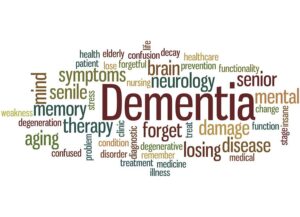Dementia affects a person’s ability to communicate. Sometimes they can’t come up with the right words to describe what they need, want, or feel. Other times they will answer yes or no questions incorrectly, saying yes when the opposite is true, or vice versa. This can make it hard for others to understand what they need, which can be frustrating for the senior with dementia, as well as their loved ones.
Understanding Behavior

Elder Care Beverly Hills, CA: Non-Verbal Communication
When seniors with dementia can’t communicate verbally as they used to, oftentimes they communicate with behavior. Caregivers may not recognize their message, and so it often seems like their behavior is random, unpredictable, or comes from out of nowhere. However, when you recognize the behavior as communication, and look for the message behind it, in most cases it begins to feel less random and more understandable. When the message is understood and the need is fulfilled, the behavior subsides.
Specific behavioral communication varies by individual, and it’s important to know your loved one’s unique signs and ways to communicate. Common example include:
- Pacing, restlessness or looking for “home” or “mother” can be signs of pain, discomfort, constipation or fatigue.
- Yelling, striking out or resisting assistance can be signs of pain or fear.
- Refusing to eat can be a sign of dental pain, nausea or constipation.
Using Non-Verbal Communication
There are many ways to communicate without words. Keep these guidelines in mind when communicating with a loved one with dementia.
- Maintain eye contact.
- Sit (or kneel) if they are sitting, so you are at or below their eye level. Standing over them can make them feel intimidated and uncomfortable.
- Pay attention to facial expressions – yours and theirs. Smiles are often contagious, but if they are serious about something, smiling may signal to them that you don’t take their concerns seriously, and may upset them further in some cases. Use your facial expressions and body language to show you take them seriously and value their concerns.
- Avoid sudden movements, which may startle or frighten them.
- Pointing at or holding up an object may be more effective than describing it with words.
- Avoid crossing your arms in front of you, which can be mistaken for non-interest, or even anger.
- Respect their space, and take care not to make them feel crowded or cornered.
- Gently touching a hand or forearm can often create a positive connection.
Elder Care can Help with Dementia
Elder care agencies take great care to find and vet professional aides who work well with seniors. They ensure that aides are properly trained, and ready to assist seniors with dementia as well as other common conditions affecting the elderly. Elder care aides assist seniors with personal care, housework, transportation, exercise, activities and companionship, among other things. Their services are completely customizable based on the senior’s unique needs and preferences.
Elder care aides also can offer high-quality respite care, an important feature of successful long-term family caregiving, especially when your loved one has dementia. Elder care can help a senior with dementia in their own home, or take them out for walks, drives, to the gym or other activities of interest. These interventions can not only provide family caregivers with essential opportunities to rest and recharge. They also provide the senior with dementia with valuable opportunities for socialization, mental stimulation, physical exercise and meaningful activity with a professional elder care aide who understands the importance of non-verbal communication.
If you or an aging loved-one is considering Elder Care in Beverly Hills, CA please contact the caring staff at Nu Care Inc. today at. 800-505-6890
Sources
https://blog.ioaging.org/home-care/how-to-use-non-verbal-communication-with-seniors-with-alzheimers/
